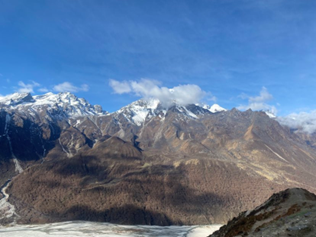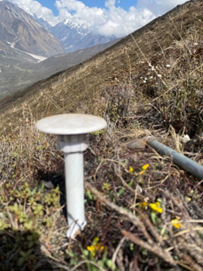News aus der Fakultät
25.07.2024
TREELINE – II Research Field Campaign in Nepal Himalaya – 2024
Continued exploration of high-altitude Himalaya in climate warming era
With the research aims at investigating the sensitivity and response of treeline ecotone in Nepal Himalaya, TREELINE research project has been continuing the high-altitude Himalayan research since 2013 in a peaceful Himalayan country, Nepal. During May-June 2024, the research field campaign composed of 11 research members including Professors, PhD, MSc and BSc students from Germany and Nepal conducted intensive field works in majestic Himalayan terrain in Langtang, Nepal. This broad-sale field mission was aimed to collect different bio-physical and climate data collection in the filed to test the research hypothesis; Climate change leads to diverging spatial and temporal responses of krummholz and non-krummholz treelines due to eco-systemically driven feedback mechanisms and climate driven species-specific growth dynamics.
The field mission commenced in the second week of May 2024. However, two weeks prior to this, PhD students Rabindra Adhikari from Tübingen University and Amrit Maharjan from Hamburg University traveled to Nepal to evaluate potential research sites in the Langtang area. They also visited the Rolwaling research site in the Gaurishankar Conservation Area (GCA) in Dolakha district to retrieve data from climate data logger sensors installed in 2023. In Langtang, after assessing four potential sites, two were selected following a confirmation visit by the entire team. The research team, divided according to specific research objectives, focused on soil, vegetation, tree cores rings, and root sampling, as well as the installation of temperature and moisture microclimatic data sensors.
The Tübingen University team, consisting of four members, concentrated on sampling soil, vegetation, roots, and setting up microclimatic data sensors. The research area was divided into two altitudinal slopes—North-East (NE) and North-West (NW)—each containing four ecological zones: Lower Krummholz (LC), Upper Krummholz (UC), Lower Dwarf Shrub Heath (LD), and Upper Dwarf Shrub Heath (UD). In total, 32 plots of 20x20 meters were established for soil and vegetation sampling. Despite the challenges posed by the rugged and steep terrain, unpredictable weather, the team's remarkable perseverance led to successful data collection. Lisa-Marie, a B.Sc. student from Tübingen University, reflected on her experience, stating, "It was a great experience working in the Himalayas for my bachelor thesis, a wonderful opportunity to learn from the field. The work was not easy, but the mountains are always motivating."
Rabindra Adhikari, a PhD student under Prof. Thomas Scholten (PI of TREELINE-II), coordinated the field efforts with Tribhuvan University, Nepal and other governmental agencies, including national park offices and conservation area offices. The team received indispensable support from local stakeholders, especially the chief of Langtang national park office in Rasuwa. The generosity and hospitality of the local people significantly contributed to the success and enjoyment of the team's stay in Langtang. The ongoing research findings are expected to enhance our understanding of treeline shift dynamics in the central Himalayas and the unique role played by krummholz structured forest. For more information about the TREELINE research project, please contact Rabindra Adhikari or Prof. Thomas Scholten.
- Adhikari, R., (2024).


